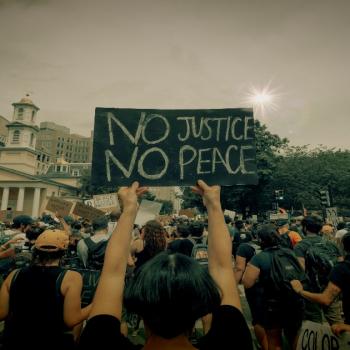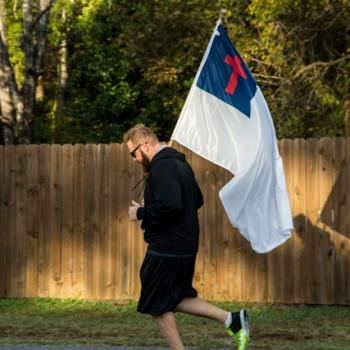Beyond being fraught with problems, from definitions to origins, white privilege is not the main problem in today’s era. White privilege wasn’t even the issue when chattel slavery was present within the States. Rather, the foundational issue is found within the very same influence upon every form of wickedness and cruelty the hearts of men can concoct. As another gentleman I had correspondence over this issue mentioned, racism is the sin du jour in today’s culture. Contrary to popular belief though, it is not the unique byproduct of our socio-cultural influences, nor is it relegated to another form of perverseness than say, murder, rape, or adultery.
Christians aren’t ignorant to the fact that the belief that a person of color is inferior to a white person, or vice versa, is diametrically opposed to the gospel. The gospel is not the “White Man’s religion” – it never was and never shall be. The gospel transcends ethnic, socio-economic, and cultural boundaries. It gives no more favor to the rich than to the poor, the intelligent than the uneducated, nor even the elite and powerful above the common and marginalized. The implications of being “one new man” in Christ Jesus demonstrate these adjectives have no true bearing in the life of the Christian.
When we elevate the concept of ethnicity above the loveliness of the gospel of Christ – we are committing an egregious form of idolatry. This isn’t just a problem of white men. There is one acceptable, over-arching identity for the Christian: Christian. This is Christianity 101. Understanding this concept does not relegate one’s ethnicity to the trash heap – on the contrary, it makes these beautiful distinctions all the more glorious as we recognize the creativity of the Lord. Yet it also displays that every square inch of the converted are wholly belonging to Christ. They are His purchase; they are His body; they are His workmanship.
It must be said then that ethnic differences are part of the grand design. We ought to be thankful for our unique heritage, yet under all of this, we remain Christians first and foremost. When we lose this focus in favor of our connection to our heritage, we neglect the fullness of our identity. When we lose the focus of the connection others have to their own heritage, we neglect the fullness of the Imago Dei. For this reason, ethnic differences are neither to be downplayed and ignored, nor highlighted as superior in any sense. Ultimately though, the unity we have in the gospel ought to be lovelier than the unity we might share between those of the same ethnicity and/or culture.
Is White Privilege Even Legitimate?
If we are going to speak of privilege, we must acknowledge all of it. In terms of privilege, the concept isn’t one altogether foreign – even in Scripture. Jacob bears a certain privilege over Esau; the Israelites over the Canaanites. Christians hold privilege over non-Christians (a restored fellowship with their Creator and escape from final condemnation).
Christian children have the inescapable privilege of being raised in a household dedicated to self-sacrifice, at least if they have obedient parents. Children who do not grow up in an abusive home or one fraught with the perils of divorce are at an advantage, emotionally and physically, to those who do. Christians who heed the ethic outlined in Scripture are privileged by virtue of their obedience. All men are privileged through the common grace of God simply because the earth is not consumed in His supremely righteous wrath.
If we look at the concept of privilege in the scope of history, modern people in first and second world countries live in an incredibly privileged time. The poor, modern American is more affluent than nearly all deemed wealthy in the history of mankind. We have access to modern medicine, computers that fit in our pockets, distributable wealth, and a choice of employment. Most people in history knew nothing beyond their trade, if they were fortunate enough to even have one. There certainly were no government subsidies or food stamps offered to the poor and marginalized.
We simply have no concept of true poverty unless we’ve gone to a third world country and even then, we leave it behind after a short duration. Most have no concept of having nearly all of our children die due to disease and starvation. Likewise, we don’t understand the true nature of governmental and judicial corruption. Hear me clearly: I am not saying corruption is to go unopposed or that there is no corruption in the American system. I am saying systemic racism and white privilege aren’t the battles we actually face. Believing this is the battle is not a prerequisite for righteousness nor a barometer determining if one cares about people of color.
What is strange in this discussion is the place categories of virtue hold. Our culture lauds consequence-free sex, yet sees no connection to Planned Parenthood targeting minorities in low-income neighborhoods. We rightly decry abuse in the home, but say a child doesn’t need mom and dad for stability. The culture predominantly denies a foundational ethic from the Scriptures, yet continues to make scapegoats of issues when wickedness, sin, and Satan are at the root.
Likewise, many within the church borrow from the worldview of the culture, which is predisposed against the root issue presented in Scripture. Because this is the case, a double-mindedness is rampant within Evangelicalism. Division is lamented – yet seems to advocate for a form of segregation within the church when the cry to flee white Evangelicals is made. Forgiveness and mercy are to be extended – yet on a contingency of reparations for the sins of the fathers.
Even still, equity and justice are purported, yet a person’s skin tone effectively means they live as if they are better than others without even noticing it. Recognizing white privilege and systemic racism – not the presence and distortion sin brings – is what it means to be woke. White Evangelicals and their derisively labeled “Uncle Toms” are at the root of all society’s ills. These are some of the simplest reasons why white privilege is a categorical issue for believers – apart from its Marxist implications.
Is the Main Problem Ethnic Discrimination or White Privilege?
I know of no legitimate Christian today who believes discrimination against people of color doesn’t happen in the modern era. Rather, I know of people in all demographics who question the validity of the common narrative. Thus, the question is not if it exists, but in what form it exists. The conversation on privilege is nearly identical. Privilege certainly exists, but the question is in what form it exists.
In the battle of essentials, the issues of prejudice and discrimination have come to the forefront, often, in a counter-productive way. Rather than symptomatically assessing the issue at the heart, we grab ahold of the fruit produced by the root issue. To our dismay, the bad fruit just keeps on growing and we collectively gather our bushels in confusion. The reality is that ethnic discrimination isn’t the endemic issue of American society, despite the tendency to make it the sin du jour. Discrimination is merely one product of the common endemic of mankind and placing the emphasis on this issue not only places the cart before the horse, but betrays Scripture’s indication of the actual problem.
The most crucial part of this discussion is not a systemic, conspiratorial oppression, white privilege, or other categorical impartations of critical race theory. Instead, there are two factors at play: sin and Satan. That same internal wickedness, which labels a fellow image bearer inferior simply by virtue of the amount of Melanin in their skin, labels their fellow black man “Uncle Tom”. The same greed and envy generated in affluent circles displays itself in the desire to rob others. Likewise, the hatred displayed by white supremacists reveals itself in the perpetuation of guilt for sins people didn’t commit.
Secondly, we know that Satan is the father of this world and desires nothing more than to divide and distract the church from her main mission, blind unbelievers from their main problem, and detract from the glory of God in the midst of it all. The powers and principalities of this age are not Donald Trump or Barrack Obama; they are not even Hitler, Mussolini, or Kim Jong Un. There is a very real presence of evil in this world effectively driving people away from the Lord. The church’s struggle is not against flesh and blood.
Nonetheless, it is a Conversation we mustn’t avoid
In the midst of all of this, our own wickedness and Satan’s craftiness forbids us from being able to substantively dialogue about the disagreements we hold. Modern man knows little of sensible conversation. Instead, he knows enraged shrieking. He has become inflamed with a sense of self-righteous indignation rather than prostrated humility before others bearing the Imago Dei. More simply: modern man has forgotten the offense of his own sins in favor of highlighting another’s.
When you approach the person evaluating the topic with a different set of presuppositions, we must be able to maintain an air of humility and mutual respect. The flow of ideas is only obstructed when an individual doubles down, refuses to listen, or dialogue about a topic with charity. The Christian, above all people, is to maintain integrity in any debate. This would not only include accurately representing another’s views – but actively seeking to imbue the conversation with truth in love.
This is not a plea to police one’s tone, but to simply recognize the person on the other side is equally human. When we approach the subject introspectively, that is, with an eye toward our own predisposition to sin, unrighteous speech, and slander – it would behoove us to pretend as if we are far too noble to stumble. If the goal is to win our brother over and above winning an argument, we would do well to approach the subject on these terms. Secondly, we would do well to recognize people can think differently than us without automatically labeling them racist or Marxist, even if we sense the logical conclusion of such ideals leads there.
Nonetheless, Christians ought to be particularly careful in using terminology adopted from ideologies diametrically opposed from their own convictions, namely, because these terms mean radically different things. They carry assumptions, histories, and intrinsic meanings to them on their own. Many seem to gravitate toward “redeeming” a term, and to each their own, but it merely serves to muddy the waters, especially when the term is a buzzword or catch all to describe a multi-faceted issue. The desire ought to be clarity, for the sake of truth, again, so that we might win our brother. If the goal of the conversation isn’t to win the brother, but to subjugate them to our demands – I sense we might be enforcing the very same things we wish to speak against.
Moving Forward in the Church
The most effective sermons are before the mirror. The most effective witness to healing a divide over the debate on racism is not more division, but a stubborn unity in the face of a world falling apart at the seams. No amount of social justice, political pandering, or tiptoeing around the conversation of ethnicity or white privilege will substantively deal with the issue at hand. Ultimately, God has been pleased to reveal His power through the thing deemed weak and cowardly to this age: the gospel. No, really: the gospel.
The power of the gospel prevails against the wiles of Satan and the gates of Hell. The gospel is that which unified Jews and Greeks and it has presently unified the church, even if she doesn’t realize those implications currently. It is all the more pressing for us to walk in that reality – but it nonetheless serves to demonstrate the point: it is the gospel which effectually does this. It is the gospel alone which has the power to do this.
To those Christians who would deny the gospel’s applicability and ability to resolve this issue within the church, I would simply beg you to reconsider the implications of such a belief. Is it too far a stretch to believe that which is capable of reconciling you to the God of all creation is also capable of uniting you with a human being, of all things? Surely, the church is fraught with individuals of different opinions, sinful tendencies, and odd habits. The glory of the gospel is that a group of individuals who would have no common bond, save that gospel, are united into one body – one new man.
This invariably means that in the midst of a fallen world where injustice is the modus operandi, Christians are present with a profound, lasting hope. We don’t embrace the weapons of this age. We embrace the truth that there is one body and one Spirit, one Lord, one faith, one baptism; one God and Father of all, who is over all and through all and in all. Since this is the case, with all humility, gentleness, patience, forbearance, love, and diligence to preserve unity of the Spirit through the bond of peace, we are commanded to walk in a manner worthy of the calling we have received.
Image Credit (modified): White Privilege by Bart Everson CC by 2.0













